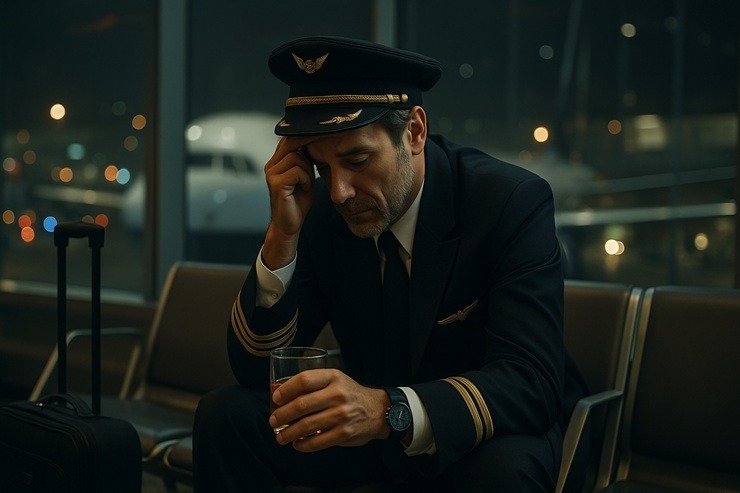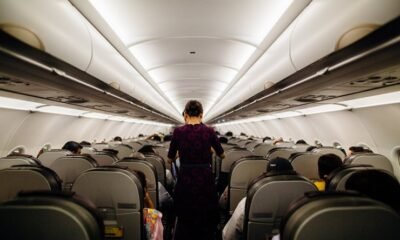Health
Why Some Airline Workers Are Battling Addiction at 35,000 Feet

Flying across time zones, waking before dawn, living out of hotel rooms—life in the airline industry often looks adventurous from the outside. But behind the perfectly pressed uniforms and polished safety briefings, there’s a less glossy truth that too often stays hidden. Addiction has been quietly spreading among airline workers, affecting everyone from flight attendants to maintenance staff, pilots to gate agents. It’s not something you’ll catch in an Instagram reel. It creeps in during the layovers, the sleepless nights, and the long stretches away from family.
While no one’s handing out champagne mid-flight for coping with stress, a growing number of airline employees have found themselves turning to substances in order to deal with the grind. In an industry where the pressure never lets up, it’s no surprise that many are reaching for a drink—or something stronger—just to make it through. And the consequences are far more widespread than most passengers realize.
How Isolation and Exhaustion Feed the Cycle
The typical work schedule in the airline world isn’t exactly forgiving. Shifts can start at 3 a.m. or stretch into the middle of the night, especially for those on international routes or working irregular assignments. Sleep becomes scattered, routines fall apart, and suddenly even the smallest tasks feel impossible. Add to that the constant time zone changes, and it’s a recipe for mental and physical depletion.
Many airline workers report feeling invisible, even while surrounded by people. That sense of loneliness, especially when combined with the physical toll of the job, can leave a person vulnerable. Some start with a drink to take the edge off after a long flight. Others are prescribed stimulants to stay alert or sedatives to help with insomnia. Over time, these habits can snowball into dependence. Before long, what once felt like a way to survive starts taking everything down with it.
For some, the wake-up call comes when they realize their relationships are unraveling, or their job performance starts slipping. But addiction doesn’t always give such polite warnings. It can be subtle. Quiet. And devastating. That’s why it’s so important to break free from addiction before it has the chance to drag someone into deeper waters. Recovery isn’t just possible—it’s necessary for those whose lives revolve around intense schedules and constant change.
California’s Frontlines: When Sunshine Isn’t Enough
California might be known for its palm trees and laid-back lifestyle, but even those golden skies can’t shield airline workers from addiction. In fact, California airports are some of the busiest in the country, making the pressure on staff even more intense. Whether it’s LAX, SFO, or one of the smaller regional hubs, workers often deal with extreme scheduling demands, high passenger volumes, and the kind of stress that builds up in silence.
What sets California apart, though, is the number of recovery resources that are specifically designed for airline professionals. The state has seen the unique pressures these employees face and responded with programs that address the reality of this kind of work. These aren’t one-size-fits-all approaches. They’re grounded in an understanding of how lifestyle and job demands fuel dependency.
One standout option in the state is Ocean Ridge Recovery, which has been gaining attention for its specialized care. Programs like this don’t just offer detox and therapy. They provide real strategies for long-term healing, all tailored around the unpredictable and intense nature of airline life. If you’re struggling, get more info on Ocean Ridge Recovery so you can reach out and start getting help tailored to you. You don’t have to try to figure it out alone.
When Reputation Becomes a Roadblock
In the airline industry, reputation means everything. Workers are expected to be steady, professional, and composed—even when the cabin pressure is the least of their worries. That culture of control can make it hard for someone to admit they’re slipping. Nobody wants to be the weak link in a chain that keeps planes in the sky and passengers safe.
This fear of looking unstable keeps many from seeking help. Airline workers often say they’re terrified of losing their jobs if they speak up. They worry about being grounded indefinitely, or worse, blacklisted in a tight-knit industry where everyone knows everyone. So instead of raising a hand, they stay silent. They self-medicate. They hope things will get better on their own. Spoiler: they usually don’t.
That silence is part of what makes addiction in this field so hard to address. It hides behind smiles, behind checklists, behind that friendly voice reminding passengers to fasten their seatbelts. But even the best actor can’t keep up the performance forever. Sooner or later, the cracks start to show—and by then, things are often a lot harder to fix.
Why Talking About It Might Actually Save Lives
There’s been a slow but steady shift happening inside the industry. Some unions are speaking up. A few major airlines have begun working with recovery organizations to quietly offer support. And more employees are starting to admit that the job takes a toll—and that toll can sometimes lead to addiction.
But this movement needs volume. Airline workers need to hear that they’re not broken, and they’re not alone. Recovery doesn’t mean losing your job or your reputation. It means giving yourself a shot at living outside of survival mode. The more people talk, the less shame sticks to the issue. And the less shame there is, the more people will take that first step toward treatment.
That conversation starts with honesty. With coworkers checking in on each other, not just about shifts and schedules, but about how they’re actually doing. It starts with supervisors who care more about people than appearances. And it grows every time someone decides to get help—even if it means temporarily stepping away from the runway.
Addiction in the airline industry isn’t about weakness or failure. It’s about a demanding job that’s often thankless, exhausting, and emotionally draining. But healing is possible, and resources are out there that get what it’s like to live at 35,000 feet and still feel like you’re falling. Whether you work in the sky or on the ground, you deserve a life that doesn’t require numbing the pain just to get through the day.
-

 Quotes3 years ago
Quotes3 years ago53 Motivational Gym Quotes to Fuel Your Workout
-

 Quotes10 years ago
Quotes10 years ago50 Most Powerful Quotes Ever Spoken
-

 Motivation5 years ago
Motivation5 years ago4 Fun New Hobbies To Try This Year
-

 Quotes1 year ago
Quotes1 year ago100 Motivational Quotes to Inspire You in 2025
-

 Quotes2 years ago
Quotes2 years ago43 Inspirational Quotes About Thoughts
-

 Quotes3 years ago
Quotes3 years ago105 Motivational Quotes by Famous People
-

 Education12 months ago
Education12 months agoHow to Motivate Yourself to Study: 6 Proven Techniques
-

 Quotes1 year ago
Quotes1 year ago77 Morning Motivational Quotes to Kickstart Your Day
































